#3 May 1802
Photo









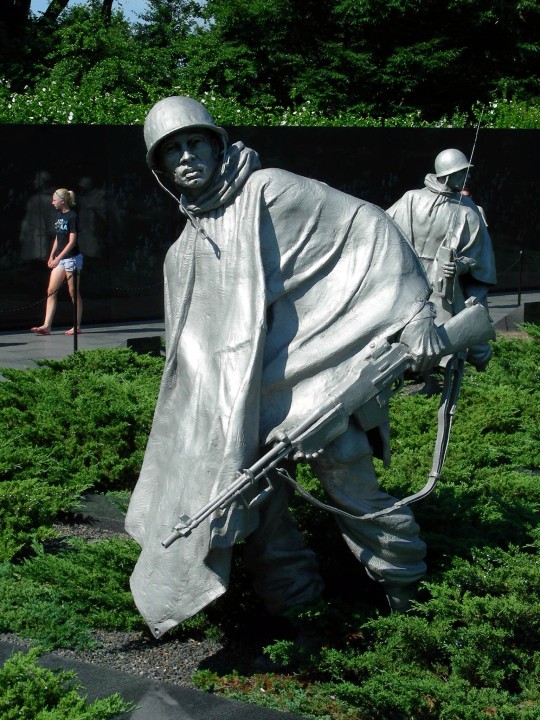
Washington, D.C. was incorporated as a city on May 3, 1802.
#Lincoln Memorial#Washington Memorial#National Mall#Reflecting Pool#US Capitol#Washington DC#incorporated#3 May 1802#220th anniversary#US history#architecture#cityscape#summer 2009#tourist attraction#USA#landmark#travel#vacation#original photography#White House#The Castle#Potomac River#Smithsonian Institution Building#Vietnam Veterans Memorial#Korean War Veterans Memorial
7 notes
·
View notes
Text


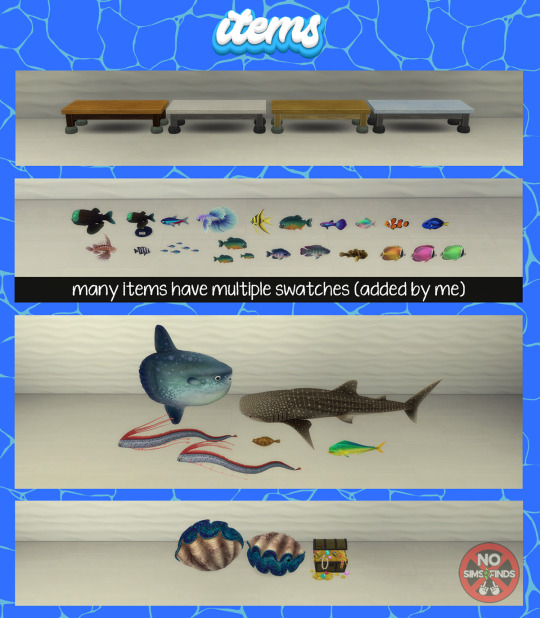


🫧 🐟 ACNH Aquarium Set 2 🐟 🫧
Sims 4, Base game compatible. 30 items - I have added extra swatches to many of the items 🌺
Set contains:
-Angelfish | 3 swatches each | 294 poly
-Barreleye Fish | 2 swatches | 912 poly
-Barreleye Fish Display | 2 swatches | 1046 poly
-Bench (functional) | 4 swatches | 664 poly
-Beta Fish | 9 swatches | 524 poly
-Bitterling | 3 swatches | 358 poly
-Bluegill | 1 swatch | 640 poly
-Blue Tang | 7 swatch | 700 poly
-Clownfish | 3 swatch | 396 poly
-Dark Sleeper | 1 swatch | 636 poly
-Giant Clam 1 | 5 swatches | 1498 poly
-Giant Clam 2 | 5 swatches | 1498 poly
-Guppy | 7 swatches | 468 poly
-Humphead Wrasse | 1 swatch | 1000 poly
-Japanese Flounder | 4 swatches | 474 poly
-Luna Lionfish | 1 swatch | 856 poly
-Mahi Mahi | 1 swatch | 1008 poly
-Neon Tetra | 4 swatches | 298 poly
-Neon Tetra Group | 4 swatches | 1778 poly
-Oarfish 1 | 5 swatches | 2002 poly
-Oarfish 2 | 5 swatches | 2002 poly
-Ocean Sunfish | 4 swatches | 1602 poly
-Oriental Butterfly Fish | 9 swatches each | 474 poly
-Pale Chub | 6 swatches | 294 poly
-Piranha | 1 swatch | 602 poly
-Piranha Group | 1 swatch | 1802 poly
-Striped Beakfish | 1 swatch | 700 poly
-Tilapia | 4 swatches | 702 poly
-Treasure Chest | 2 swatches | 2401 poly
-Whale Shark | 1 swatch | 1978 poly
Type “animal crossing aquarium2” (no space between aquarium and 2) into the search query in build mode to find quickly. You can always find items like this, just begin typing the title and it will appear.
📁 Download (SFS, No Ads): HERE
📁 Alt Download (still no ads): HERE
🐙 Aquarium Set 1 is HERE 🦑
Always suggested: bb.objects ON, it makes placing items much easier. For further placement tweaking, check out the TOOL mod.
Use the scale up & down feature on your keyboard to make the items larger or smaller to your liking. If you have a non-US keyboard, it may be different keys depending on which alphabet it uses.
As always, please let me know if you have any issues! Happy Simming!
✨ If you like my work, please consider supporting me
★ Patreon 🎉 ❤️ |★ Ko-Fi ☕️ ❤️
★ Instagram📷
Thank you for reblogging ❤️ ❤️ ❤️
@sssvitlanz @maxismatchccworld @mmoutfitters @coffee-cc-finds @itsjessicaccfinds @gamommypeach @stargazer-sims-finds @khelga68 @suricringe @vaporwavesims @mystictrance15 @public-ccfinds
The rest of my CC
#s4cc#ts4cc#sims 4 aquarium#sims 4 fish#sims 4 animal crossing#sims 4 tropical#sims 4 maxis match#sims 4 object#simdertalia
232 notes
·
View notes
Photo
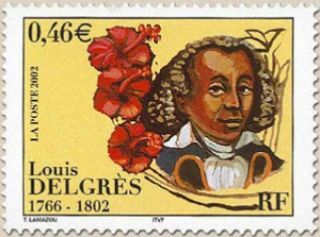
On this day, 28 May 1802, the Battle of Matouba took place in Guadeloupe between rebel enslaved people and French colonial troops (content note: suicide). Slavery in the colony had been abolished a few years prior, but it was reintroduced by Napoleon Bonaparte in 1802. In response to this, enslaved people in Guadeloupe rose up in revolt, led by a biracial free man and former French military officer, Louis Delgrès (pictured on a commemorative stamp). Though the rebels initially made gains, eventually they were overwhelmed by the superior force of the French army. The enslaved people made their last stand in the Battle of Matouba, and holed themselves up in Fort Saint-Charles. Realising they would be defeated, the rebels decided to kill themselves and try to take as many French troops with them as possible. Delgrès distributed barrels of dynamite amongst his troops, then set them on fire while men, women and children shouted "Live free or die!" Around 500 rebels were killed in the blast, along with up to 400 French troops. More information, sources and map: https://stories.workingclasshistory.com/article/7932/guadeloupe-enslaved-rebellion-ends https://www.facebook.com/photo.php?fbid=634020708771148&set=a.602588028581083&type=3
108 notes
·
View notes
Note
Can you tell me about Louis de Vegobre and his possible relationship with Laurens and Kinloch?
Sure! Others will certainly know more, but here’s a little of what I’ve pulled together about these three.
Louis Manoel de Vegobre was a Swiss lawyer and intellectual who befriended Laurens during his time as a student in Geneva. He tutored Laurens in mathematics, and in return Laurens taught de Vegobre English. Kinloch arrived Geneva in May 1774, and although they only spent a few months together there (Laurens left in July 1774), they quickly formed a close-knit circle, studying and socialising together, and mingling with other English students and eminent Genevan scholars and scientists.
There is little written correspondence from that time, as there was no need to write letters to those who lived so close. But it is evident from Laurens’ letters after his departure that he loved his time in Geneva, in large part because of the relationships he had built there - he writes to Kinloch on 23 August 1774 that “I dont know when I shall get into such a valuable Set of Acquaintance as I have left”.
Whether all of this remained purely platonic, in the style of romantic friendship, or extended into homoerotic or even homosexual realms, is impossible to prove definitively - but there is a good deal of evidence that the three of them were more than “just friends”.
For one, they mingled with figures who were known to have homosexual inclinations. Among these was Swiss historian Johannes von Müller (himself at the centre of a web of queer figures, including Swiss writer Karl Viktor von Bonstetten), who was known for his homoerotic love letters and, per Rictor Norton, “always travelled with young male companions, and even set up house together in the Alps with the American Francis Kinlock [sic]”. They stayed together in Chambésy in 1775, which presumably is what Laurens is referring to, with evident longing, in his letter to Kinloch on 10 March 1775:
Mr. Boon has communicated your plan of spending the summer with Vegobre in some convenient retreat in Switzerland, a plan which I should of all things like myself, and which I dare to say you will find great benefit from.
What three young men of a certain persuasion might get up to in the privacy and safety of an alpine retreat I will leave to your imagination.
Side note on Müller and Kinloch - in 1802/3, Müller was involved in a homosexual scandal, after a former pupil faked love letters to him from a made-up admirer, to which Müller responded with equal (and damning) fervour. The ensuing scandal cost Müller his fortune. He writes a letter to Kinloch on 12 May 1803, explaining his dire situation, to which Kinloch responds:
L'idée de ce qui aurait pu arriver à cette extreme nocturne me fait frémir - Vous souvient il, cher ami, du commencement do notre liaison à Geneve?
My transcription:
The idea of what could have happened at this nocturnal extreme makes me shudder - Does it remind you, dear friend, of the beginning of our affair in Geneva?
Clearly, the mention of the scandal was a reminder to Kinloch of whatever they may have gotten up to twenty years prior.
In Laurens’ absence from Geneva, Kinloch and de Vegobre remained close, and all three of them wrote to and about each other using expressions of deep love and affection, expressing a desire for contact and closeness - which, to me, often veers into the romantic.
Here are some examples, in chronological order:
My beloved, my dearest friend is Kinloch […] Let me say again: Kinloch is my beloved, my dearest friend. […] You have began to make me feeling how hard it is to see the departure of a man to whom one’s heart is addicted
Louis de Vegobre to John Laurens, 24 December 1774
I would be wrong to hide from you that I was upset at you [but now I want to] occupy myself only with the pleasure I had upon seeing that your heart is without fault, and that you have maintained the same sentiments towards me that you expressed to me when you left Geneva. […] Permit me to remark to you that [a time of adversity] is where we know our friends, and that it is here (I dare say) that you will see that the attachments of my heart are not a light bond formed by pleasure which does not last beyond it. […] You congratulate me on my friendship with Kinloch, oh how right you are to congratulate me! What an excellent man! What a friend I have in him! […] I repeat that I am entirely at your service & that I responded very sincerely and very deeply to the feelings that you have expressed for me.
Louis de Vegobre to John Laurens, 18 October 1775
You and I may differ my Dear Kinloch in our political Sentiments but I shall always love you from the Knowledge I have of your Heart.
John Laurens to Francis Kinloch, 12 April 1776
we hold too fast by one anothers hearts, my dear Laurens, to be afraid of exposing our several opinions to each other […] Be certain that I never shall forget you
Francis Kinloch to John Laurens, 28 April 1776
that Letter & the pretty gift that you attached are very agreeable marks of your friendship […] I learnt that I was loved & esteemed by you as much as I could have desired […] I am much persuaded, my Dear, that if we could live together our mutual happiness would be augmented; especially when I think of the calamities that surround you, I would desire to be close to you, to witness your fortitude and to offer you the relief of my friendship […] I saw this morning our friend Kinloch: what shall I tell you of him which you don’t already know? […] I regard it is as one of the joys of my life to have become his friend.
Louis de Vegobre to John Laurens, 7 June 1776
And after Laurens’ blistering letter to Kinloch about their differing political views, Kinloch seemingly responds with hurt and offence, which Laurens tries to smooth over with a reaffirmation of his feelings:
I have no Copies of what I write, and therefore can’t be exactly sure of all the Expressions which I used in my Letter, this I am persuaded of that there was nothing in it that could be construed to throw any Imputation upon the Qualities of your Heart on account of the side you took in our political Dispute […] It was from the great Opinion I had of your Heart that I first wish’d to form a Friendship with you, it is from the great Opinion that I still have of it, that I am exceedingly desirous of cultivating and improving that Friendship […] I still think your political principles wrong, the Sentiments which you have adopted with respect to your own Country strike me with horrour, and I hope you’ll change them_ but I am persuaded you think they are right and your Heart with me is unimpeached_
John Laurens to Francis Kinloch, 30 September 1776
(Extracts above from de Vegobre’s letters of 18 October 1775 and 7 June 1776 are taken from my translations of the original French.)
#historical john laurens#john laurens#francis kinloch#louis de vegobre#johannes von muller#queer history#18th century history
80 notes
·
View notes
Text
In the Spirit of the release of Wednesday on Netflix, My first Plant post will be her favorite flower, Inspired by her favorite unsolved Crime
-The Dahlia

--Language of Flowers/Plants
In the Victorian era, the “language of flowers” was a way for women and men to send messages to each other. At that time, expressing feelings of love and affection was taboo. Thus, a bouquet of specific flowers was a way of saying what you feel, without really saying it.
The dahlia symbolizes the commitment and the eternal bond between two people. Used to express intimate, personal feelings, they represent elegance and dignity. The dahlia is also a symbol of loyalty and happiness for your loved ones.
The dahlia is a symbol of change, which can also represent betrayal. It is also a symbol of lush beauty, power, and many gifts.
--Metaphysical Symbolism
Dahlias are the official birth flower for August, although other traditions recognize them as the November birth month flower instead. Though most of the symbolism is positive, dahlias still carry a few negative connotations, including betrayal, dishonesty, and instability. Moreover, this beautiful flower is often perceived as a symbol of diversity since its petals appear to fit perfectly into the whole head.
Though I found it difficult to find anything specific on the use of the dahlia in specific spells or for casting, its use can always be dependent on intent in its casting and its meaningfulness to you.
--History
The dahlia is native primarily to Mexico, Colombia, and Central America. The Aztec people would call this flower “Cocoxochitl,” which means “cane of water,” referring to its hollow stem. Initially, the dahlia was used to feed animals on its foliage and stems.
The dahlia was introduced to France in 1802 by a botanist, Doctor Thibaus. The Swedish botanist, Andreas Dahl, gave a name to this flower, Thus becoming a “Dahlia.” The first species introduced were the dahlia coccinea and tha dahlia pinnata.
When crossing these two species, they quickly realized that this flower allowed for many genetic combinations, which promptly widened the range, and thus, created new varieties of dahlias. The dahlia is considered as being one of the most prolific plants in terms of colors and shapes. With over 50,000 varieties available.
--Gardening
You can cultivate the dahlia in all regions, provided that it is exposed to the sun and watered regularly. It would be best if you plant it in clay soil from late April until early May at a depth ranging from 3 to 10 centimeters, depending on the size of the bulb.
You should space each bulb about a meter apart for large varieties, and 50 centimeters if it is a dwarf dahlia. It is strongly recommend you use a stake to support the plant in the case of a gust of wind.
--The Unslolved Crime
While i wont be going in depth of the murder here, i will provide a link to the story of The Black Dahlia
#wednesday netflix#netflix wednesday#the addams family#wednesday addams#vtuber uprising#gardening#buttergoat#plants#dahlia#flower#garden#pagan#metaphysical#language of flowers#wednesday#emma myers#jenna ortega
73 notes
·
View notes
Text
Tuesday 9th April 2024
The plan today was to take a trip up Table Mountain. However, best made plans and all that, didn't quite work out. The main reason for this, and quite a good one as reasons go, was that as far as we could tell, there was no Table Mountain. Where it was supposed to be was the biggest cloud ever. The Tourist Information lady was insistent it was not worth going; maybe tomorrow she said. Well, how about going to the wine fields instead. The bus went at 8.30 she said, it's not possible today.
So with the aid of a flip chart and slide rule we rescheduled and bought a ticket for the around town HoHo. In time this took us to the cable car for Table Mountain. Eerily, cables emerging from the terminus at a 45° angle were quickly immersed in cloud. That's official then, it's off for the day. Our hop-on completed its loop and we were back at the Waterfront enjoying a flat white. Tomorrow we are booked on the tour to Robben Island so we thought we'd pop into the Robben Island museum to do a bit of swotting up before the trip. Now I really don't know why we do this to ourselves, but we utterly depressed ourselves regarding the life of one famous inmate, Robert Sobukwe who happened to be a member of the PAC (Pan African Congress). Wherever we go we seem to come across desperate stories of heroes in our lifetime whose bravery we have either had no idea of, or we have entirely overlooked. This man was jailed for 3 years in 1960 for standing up for the rights of his people, not released at the end of his term; instead sent to Robben Island where he remained until 1969. He was then sent on to Kimberley spending the rest of his life under 12 hours a day house arrest, dying in 1978 from lung cancer. It would seem that Robben Island has been used in many ways since 1658 when the Dutch installed its first political prisoner. Since then it's been used by both the Dutch and British for all sorts of groups; lepers, prisoners, lunatics, you name it. The island's best attribute is that it's almost impossible to escape from. Let's hope we catch the return boat tomorrow. I'm sure by then we'll be completely suicidal and we haven't even touched on apartheid yet!
South Africa has indeed had a chequered history. Discovered by the Portuguese, then owned from 1652 courtesy of the Dutch East Indian Company until 1795 when the British took it because they were worried the French might take it. In 1802 the British handed it back to the Dutch, only to take it back again in 1806 because this time we were having Napoleonic war problems. Confused? I'll say but it must have been far worse for the South Africans. From one day to the next they wouldn't know if they were Dutch or British. Then in May 1961 they declared themselves a Republic and they became South Africans so that sorted it. Let's hope we shall be better informed tomorrow after the visit to Robben Island.
Back to the Waterfront for a rubbery chicken, roast potatoes, salad and of course a bottle of very reasonable SB and watching Mission Impossible.
Busy day tomorrow hoping the drizzle might have stopped.

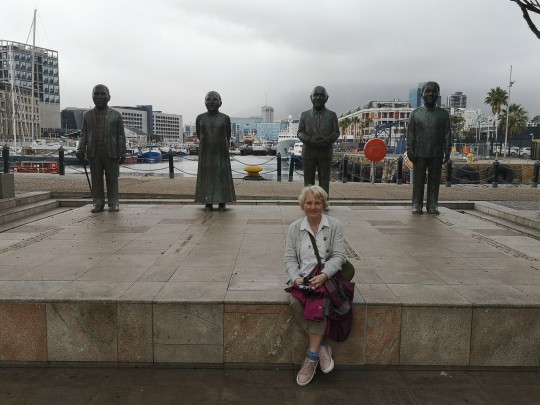


4 notes
·
View notes
Text
A Timeline for The Strange Case of Dr Jekyll and Mr Hyde
The years here are dated according to which of the three years of the novella they take place in, not their historical location. 18– is used for unknown years. Notes are placed underneath each with speculation and justifications for the dates provided.
18–, 10 years previous: Jekyll and Lanyon have a falling out
This previous is dated from Chapter 2, not the first experiment
Year One
18– ??: Jekyll turns into Hyde for the first time.
The door story is dated in winter (December - February) and Utterson is still concerned about the will, so we could assume that Jekyll turned into Hyde for the first time earlier the same year or late the previous year
Lanyon says the entries in Jekyll’s logbook dated back ‘many years’ but ‘ceased nearly a year ago’. This occurs early in January of Year Three of the novella. I have no explanation for this, maybe he was just still in Year Two brain, happens to the best of us.
18– ??: Jekyll gets an apartment and a housekeeper for his Hyde persona in Soho. Simultaneously / around the same time Jekyll tells his household about Hyde and calls upon them to make himself ‘a familiar character’.
18– ??: Jekyll writes out the holographic will leaving everything to Hyde
1801, sometime in winter, 3 am: Hyde tramples a girl and is forced to pay money for it. He stays in Enfield’s house for the rest of the morning and the cheque is payed when the banks open.
It’s most likely December - It’s winter, and the Danvers murder occurs ‘nearly a year’ later so December would make sense seeing as November’s still autumn and this is the closest winter month to October.
If after Chapter 3 the events are ‘nearly a year later’ also, it can assumed that the events of Chapter 1 - 3 likely all take place over December / early January
1801, ??: Following the Enfield incident, Jekyll creates a separate bank account for Hyde
1801, Sunday: Utterson walks past the door with Enfield and he recounts his story. Utterson goes home and examines the will before deciding to go and speak to Lanyon where he learns he and Jekyll have not been friends for 10 years.
1801, unspecified amount of time (few days perhaps?): Utterson waits for Hyde
Still winter, mentions frost
1801, after a time: Utterson meets Hyde.
1801, two weeks later: Utterson talks to Jekyll about Hyde after a party.
Year Two
1802, August: Jekyll turns into Hyde involuntarily for the first time and goes cold turkey.
The event is dated ‘two months previous’ to the murder in October, so it’s August
1802, October: Hyde murders Sir Danvers in view of a witness maid before fleeing the scene of the crime. He turns into Jekyll at home and destroys the key to the back door. The maid calls the police at 2 am after fainting for an unspecified amount of time. They call on Utterson the same day and investigate the crime scene and Hyde’s house. Utterson goes to Jekyll’s house late in the afternoon to talk to him and receives a letter supposedly from Hyde, but a servant tells him they received no letters. He goes home and shares a drink with Mr Guest who compares the letter with a dinner invitation from Jekyll and concludes that they were written by the same hand.
Jekyll says the news of the murder became public ‘the next day’ but Utterson hears people crying it in the square when he visits Jekyll which is presumably on the same day of the murder. Possibly the murder occurred late the previous day before midnight, and the maid was passed out for like two to three house before waking up at 2am and calling the police.
1802, October to January: Jekyll renews social activities and charity and sees Utterson more regularly, ‘almost daily’. He continues to sin in secret but in his Jekyll persona.
18–, 10th December: the date on Jekyll’s letter to Lanyon.
The letter was written on the ninth and Jekyll believed the letter may be delayed and Lanyon wouldn’t receive it until the next morning, in which case it would make sense for him to date it 10th JANUARY in anticipation. December is either a typo that wasn’t caught even after 100 something years or Jekyll/Hyde was so out of it that he completely misdated the letter.
Year Three
1803, 8th January: Utterson dines with Jekyll & Lanyon
1803, 9th January: Jekyll sends a letter to Lanyon requesting his help. Lanyon receives Hyde at midnight.
1803, 10th January: Hyde turns into Jekyll in front of Lanyon. Jekyll goes home and sleeps, but upon walking across the court in the morning he turns back into Hyde. It takes a double dose to restore himself, but six hours later he turns into Hyde again.
Hyde is received by Lanyon at midnight so in the intervening time to make the potion the date has technically changed to the 10th
1803, 12th January: Utterson calls upon Jekyll and is denied
1803, 13th January: Lanyon writes his narrative
He places the 9th January as ‘four days ago now’
1803, 14th & 15th of January: Utterson calls upon Jekyll and is denied
1803, 16th January: Utterson dines with Mr Guest
If dated from the 12th, the 16th would be the date of the ‘fifth night’ mentioned
1803, 17th January: Utterson visits Lanyon who he finds sick. He says he’s had a shock and refuses to elaborate, but decries Jekyll. Utterson goes home and writes a letter to Jekyll.
Again, if dated from the 12th, the 17th would be the date of the ‘sixth night’
1803, 18th January: Utterson receives Jekyll’s response letter which tells him that he intends to seclude himself for the rest of his life.
This is the ‘next day’ from the 17th
1803, 25th January: Lanyon takes to bed
A week from receiving Jekyll’s letter on the 18th
1803, around 25th to 8th February: Lanyon dies
‘In less than a fortnight’ from the 25th
1803, night after the funeral: Utterson opens Lanyon’s last letter and finds another letter inside telling him not to open it until the death or disappearance of Jekyll.
1803, unspecified period: Utterson continues to try and visit Jekyll but eventually falls off
1803, Sunday, unknown month between January and March: Utterson and Enfield encounter Jekyll at his window before he abruptly retreats.
1803, March, Sunday: Jekyll cries out to god. This is the last time Poole hears him.
The last time Poole heard Jekyll was ‘eight days’ before the last night, which if we date to Monday would make this day Sunday
1803, March, for a period of a week: Hyde locks himself in the cabinet and calls on Poole to get chemicals for him
1803, March, possibly Monday: Jekyll writes his statement under the influence of the old powders. The last night occurs: Hyde commits suicide and Utterson goes home to read Lanyon and Jekyll’s narratives, promising to return before midnight.
Poole says he’s been called upon ‘all of last week’ and has been scared for ‘about a week’. ‘Last week’ would imply the week has passed, so Monday would make sense.
Jekyll’s statement is ‘dated at the top’ to the same day as the Last Night. If Jekyll wrote the statement this would be unusual: Poole recalls the last time he heard him being ‘eight days’ from the last night when he cried out to god. Why would Jekyll cry out to god if he still had some of the old salt? Was he crying out because he realised he had run out of it?
Why would Poole only hear Hyde and not Jekyll from that day if he still had some of the old salt? Jekyll remarks that his face is now ‘sadly altered’ so he could be an imperfect transformation, not fully Jekyll but not fully Hyde.
Alternatively, Jekyll could have not written that statement at all. Hyde didn’t destroy it despite it being in plain view, and we know he shares the same handwriting as Jekyll. He also wrote letters to Lanyon and Poole while stuck as Hyde in the hotel in his Jekyll-handwriting and neither questioned wether or not it was him writing. Who’s to say Hyde couldn’t convince Utterson too?
#finally the skills I learned from my fnaf / batim phases have become useful again#if you need anyone to go trawling through a text to scramble together a complex timeline from scraps of information#I am THE GIRL to call#this is my redemption arc#anyway sorry for the weird formatting#please enjoy#the strange case of dr jekyll and mr hyde#jekyll and hyde weekly#jekyll and hyde spoilers#j&h ch10
25 notes
·
View notes
Text
September 2, 1809
Couche at 1/2 p. 12. Rose at 7; at 10 had finished "Le Voyage de Decouverts aux Terres Australes in 1800, 1 801, 1802, 1803, 1804"; fait par ordre de l'Empereur; redigé par M.F. Peron; tom, 1me.¹; quarto; 500 pages; Paris: 1807. Have been amused, particularly with his account of New South Wales. I mean the English settlements at Port Jackson, Botany Bay, &c. This work will probably consist of many volumes, of which only the first has reached me. Sent Anna to hunt up la Han.² See June 10. It is no easy matter, ma Min.,³ to determine how to dispose of myself. Why stay here? To be sure I am unmolested and live at no great expense, but tem. fug.⁴ and nothing done. When I came here it was with intent to stay till answers should be received to my letters written to the United States. The moment of leaving London, and ———. Just there it was announced to me that a lady in the library wished to speak to me. "What sort of lady ?" "Young and beautiful." In truth, she is very pretty; not at all a Swedish face; an aquiline nose, seems a little turned; blue eyes, very fair, very black hair and eyebrows; speaking svenska⁵ and a little French. The pretence (perhaps the real object) of the visit to inquire about certain friends in England and the means of getting there. On my remarking that she could not from her appearance be Swedish, she said she was born in Petersburg, and left me her address. A sad interruption this to the calculations I was about to make! The summary is that I am resolved to go without knowing exactly why or where. Mr. ———, as was predicted, has not brought me the report of vessels. The facility of getting to a particular place may of itself determine my course. To be sure the embarras⁶ of traveling on the Continent is very great, but I am in utter despair of receiving letters through England. Evening: I have been to Hedboom's to see the book-keeper; out, and nothing done. Went on to see la Russe⁷; found her toilette very prettily made and she engaged on a piece of embroidery; a most convenient visit; too much to write. Home at 7. Have been rummaging in the library and have brought into my room "La Dot de Gazette"; a roman⁸ and Montesquieu's "Grandeur and Decline of the Roman Empire."
1 "Voyage of Discovery to the Southern Lands in 1800," etc. Made by order of the Emperor. Edited by M.F. Peron. Volume I. (Should be tome premier).
2 For la Hanovrienne.
3 Probably for ma Minerve. My Minerva.
4 For tempus fugit. Latin. Time flies.
5 Swedish.
6 The embarrassment.
7 The Russian lady.
8 "Gazette's Dowry"; a romance.
5 notes
·
View notes
Text

@aristobun - Names have been changed but here's a story that may have healed a rather deep wound in me. Enjoy! <3 TW: violence implied
Fun Fact: All images were created through AI text prompt.
“All you’ll ever be is a stepping stone for the men that use you and throw you away. Remember my beautiful little fool, there’s always someone out there that’s prettier, smarter, and willing to do what you won’t to keep your fella satisfied.”
Her mother’s voice flittering in and out of her head, a hellish echo from her childhood and her growing up years on a vast plot of land referred simply as the Copperline by the locals. It took her back to that rambling hodgepodge of a house with the coal stove and the root cellar built into the dig out hillside and its rooms with ceilings at odd angles and the doors that went seemingly nowhere.
“Now what’re you goin’ to do with her, Mar?”
Was what her father would have asked if he’d been sitting in the passenger seat next to her. Here she sat with the station wagon idling as she gripped the steering wheel so tightly her knuckles were turning white as her face turned red as a beet, clashing horribly with her red hair.
Worthless. Selfish. Stupid.
She could almost feel the blows landing from those long ago locked away memories of mother’s wrath. Mary could almost feel the hands gripping at her throat again and quickly blocked the thought away back into the box. Heart pounding and eyes welling up with fresh tears from past pain a knock at the window sounded. Gil Betcher, the undertaker and funeral coordinator at Palmer & Higgins Funeral Home had popped out and was holding a cordless phone. All while trying to keep his suit dry and his hairpiece in place as it flapped in the late summer wind as the storm rolled in. The sandy blonde piece of carpet resembled a dead squirrel so closely that Mary’s eyes bugged for a moment half thinking she was seeing him be attacked in the parking lot.
“It’s for you!”
Cranking down the wind hurriedly Mary gave him a look of thanks and accepted the heat plastic weight.
“Ms. Pettymore…It’s Charlene at The Whispering Pines.”
“Yes?”
It had been ages since anyone had thought Mary wasn’t married. Alas, she’d been married since she was 18. Her marriage to Bill Higgins, the one and very same whose name was on the building had been a rushed one and that was a story for another day.
“We went in to give your father his pain medication and I’m sorry, Mrs. Higgins but your father has passed away.
“How long ago?”
A quick shuffle of paper and she had her answer.
“Ten minutes ago.”
‘Ten minutes I could have had with him but I was here picking up this bitch.’
Mary thought to herself as her mouth set in a firm straight line as she cast a side long glare at the lavender hued monstrosity of an urn that held the last remains of the former Mrs. Cecelia Ann Pettymore. Or Celia as she had been known to the few that called her friend. $1600 for a Grecian style naturally occurring Roman marble finished with gold fixtures and name plate with custom engraving of her name and dates.
“Well, good news, Charlene. I’ve got Gil right here. He’ll be over to collect him very shortly.”
Passing the phone back to Gil she pulled the car into reverse and stopped quickly, tires squealing slightly. The heart clenching nausea and knots tangled in her mind slipped for a moment and Mary Pettymore-Higgins’ niceties and manners simply fell away much like her world had fallen apart. Her filter flew off and her ID took over.
“He’s gone Gilbert. He’s over at the Pines room 1802 in the blue wing. Go and pick him up, please.”
Gil Betcher straightened himself a little taller, back into business mode.
“Are you thinking of doing the complete Gold package?”
Mary was almost surprised at her ID’s straight forwardness as she watched her own hand shoot out from the driver’s side window and grab hold of the first thing she could, Gil’s crotch, and squeeze just a firmly as she did her steering wheel. This sleaze bag that worked for her husband and herself, a man she herself had cooked for every holiday since she had married into the Higgins family, had the balls to ask her if she was going to be tacking on another $845 to her own father’s funeral not ten minutes after his passing.
“Did. I. ASK you about the gold package, boy? I. TOLD you to go and pick his earthly body up for cremation. You’ll have him done tomorrow afternoon by 4PM and I WILL be picking him up at 4 on the goddamn dot.”
Each important word was punctuated by what was surely a heart stopped harder squeeze to the undertaker’s nether region. A horrified shriek squeak left the man’s mouth as he saw a definite change in the woman he knew to be as gentle as a lamb. Everyone in the town of Miller’s Ridge knew what kind of life she’d had growing up. Then she married the biggest skirt chasing Tom Catter in town. Perhaps this is what finally pushed that poor sweet woman over the edge.
“Yes, Ma’am.”
Pulling her arm back she threw the car in reverse again and peeled out heading left sharply enough to cut off Irene Lumming’s silver chevy as it tried to turn in into the lot. Irene honked and called a rude name from her window just in time to be cracked in the face with a Stop N’ Sip mug thrown with surprisingly good aim by Mary as she completed the turn followed by a
“Piss off, Irene!”
“You see this shit, Gil?!”
Irene had yelled before pulling into her reserved spot on the right hand side of the car park towards the beauty salon where she worked.
“Her Daddy’s gone now too, Irene.”
“Aww hell this town don’t stand a chance now that she’s getting her feeling back. Always knew she fiery but she’s always been so sweet. Think she’s gone and cracked up?”
“Hard life n’ it’s hard to tell presently.”
Was all Gil was able to say as he tried very hard not to focus on the dull bruising ache that was throbbing below the belt. He now wondered if she’d done permanent damage. He feared that she might do worse to him if she circled back and still saw him standing here like a damn goober eating idiot.
Somewhere down Snapping Turtle Lane the Buick Electra Estate Wagon owned by Mrs. Mary Higgins was officially owning up to its horse power. The gravel kicking up behind her made her smile for a moment until she caught a glimpse of a familiar bottle blonde bouffant in her rearview. Sharp blue eyes locked onto her own as the form took better shape. The smell of Roman Sunset perfume and Tellings-Boyce cigarettes filled her car as Celia took shape once more. The she sat, perched and looking like she could back hand Mary from where she sat. Her black shift dress paired with pearls and pillbox reminded Mary of the night of her graduation night. Her mother had backhanded her for asking where her graduation cap had gone and called her an idiot of getting a black eye and losing her cap. There were still photos of her vain attempt at covering her shiner as best she could with makeup and her long red hair. Bill had still proposed to her that night to her and even told her she was pretty as a picture even with it. The following month they were married, he was working for father and she was cleaning houses for the well to do’s around Lake Mitchum.
“Where are you off to, girly? Running away?”
Slamming on the brakes for a moment she came to a screeching halt enough to find the urn onto the floorboards with a solid thunk.
“No, Cecelia. I’m not running away. I’m taking care of you once and for all.”
Turning into the familiar driveway she eased herself up to the garage and hurried in and set to work. She could have sworn she felt her mother follow her every move.
“You may as well sit down if you intend to watch this.”
Mary said as she rummaged through the hall closet for her stash. The wooden box she kept it in hadn’t change since she had discovered the plant’s wonders in her teens. Bill had been the one to get her stoned out in the rushes by the Copperline Creek. Alas, he had changed massively after they married he became, slowly, what he was now. A man that couldn’t keep his dick in his pants if the world depended on it. She knew he had girls all over the counties but right now she could care less about him and his flings, she’d deal with all that and him later.
“What in the hell do you think you’re doing?!”
Came a bark from the depths of her mind as she smelled that stupid perfume and heard that voice.
“I’m planning to get myself calmed down so I can deal with you, Mother.”
Cornflower blue eyes blinked at her as Mary sat herself down at the kitchen table and went about the ritual she loved deeply. The spicy sweet heavy scent of it hit her and she smirked at the scowl she imagined her mother sitting across from her at the tidy kitchen table.
“No good drugged up hippy. No wonder Bill steps out on you. Wasting his money on yourself with that awful addiction.”
Deftly picking apart the heady green bud she rolled herself quite possibly the largest joint she’d ever crafted, lit it and inhaled deeply holding as she listened to her mother’s voice before she exhaled a rather large plume of smoke in Celia’s direction, squarely hitting her mother’s face.
“Shut the hell up.”
Celia bristled at that fact that it wasn’t as request but a command.
“Why are you making another one?”
“Because you and I are going on a small trip and I’m going to need backup Which reminds me…”
Grabbing a sandwich baggie, the weed and an extra lighter she wrote out a note to Bill telling him that dinner was in the crock pot and went about taking the stash of cash she’d fond in one of his favorite hiding spots. $600 was there, she’d thought of only taking fifty of it but she’d had a change of heart as she thought back to their anniversary and how he’d spent it with Kelli Stetler two counties over hold up in a sleazy little no tell motel with a heart shaped tub and tacky red decor. She’d had a feeling and followed him there, had the photos to prove it and entrusted the key to the safe deposit box to her oldest and dearest friend, Misty Chanter, for safe keeping.
“Beer money.”
Celia almost smirked at that one but still regarded her with deep suspicion. Grabbing her purse once more she spotted the Hoover vacuum sitting in the corner where she’d left it last night after coming home and cleaning the place top to bottom. Bill, as usual, was gone ‘on business.’ A fresh bag was grabbed and it was toted out the station wagon along with an overnight bag she’d packed and kept for when this day came. Stopping by the gas station she filled her gas tank. She’d completely forgotten that she was still puffing away on her hand roll until she’d nearly burnt her lip. Snuffing it out in the ashtray she slipped the next one into her pocket and went into the Quiker Liquor cash and carry and bought herself a twelve pack of Schlitz and a bottle of Schnapps, the cherry kind that she used to love at bonfires and tailgates. She’d not realized that the second joint had migrated from her pocket to her lips as she browsed the selection of lottery tickets in the glass display in the front of the counter.
“I-I’m not sure you can smoke that in here, Mrs. Higgins.”
Came a squeaky voiced statement from the kid, Jeremy Holden, who Mary used to babysit.
“Wasn’t plannin’ on it, Jeremy. Just need this and the change and one of these…
She stopped as she grabbed a bottle opener from the display by the register.
“Oh and it’s Ms. Pettymore, actually or it will be once Burt Fleischer serves Bill at 6:45 today.”
Jeremy wasn’t sure exactly what he was supposed to do with that information but he could tell by her demeanor Mrs. Higgins Ms. Pettymore was certainly dealing with something big. She gave him a pretty smile and off she went smelling like some of the best home grown he’d never get the chance to try until he was at college. In his nineteen year old heart he almost felt sorry for Bill Higgins. Especially as Mary walked away with a swing in her hips. The fact that he saw her pull out of the parking spot like the hounds of hell were on her tail made him slightly envious of her driving skills.
“So…you’re planning on getting tanked, drugged up and going back to my house? Why?”
Ever the lady even in death, Celia kept her ankles and knees tightly closed together. Flicking on the radio Zeppelin filled the car. The scowl on her mother’s face deepened and made Mary thrum with a sort of joy that made her almost positive that she’d lost her mind.
“Oh. Surely you mean my house, right?”
Owl eyes and ruffled feathers from the not to friendly ghost on the backseat. In a blink Celia was shotgun and trying to grab the wheel. Even in death her fingernails resembled talons. The only difference was that they couldn’t inflict pain or damage.
“That house’ll never be yours! It’s MINE!”
“Wrong!”
Her voice rang out sharp and quick like heat lightning and it was enough to the pin the Spector of her mother to her seat in silent shock. According to family lore that dated back to the 1700s and the settling of the town itself it was to be passed to the continued line of sons blood line. Being Mary was the literal last of the settling line to be born to the final son it was bittersweet. There was also the legal state of things. Her mother left no will, her father, Herschel had had the good sense to prepare as best he could with the time given to him, all six months of it. According to the Commonwealth Mary Colleen Pettymore-Higgins was the brand spanking new owner of 445 acres of land, one rambling farmhouse and a rental property at the end of Pettymore Hollow which ensured a steady and tidy little sum each month. As of right this moment each month’s rent was being put partially towards monthly tax payments to keep up to date and partially put into savings that only Mary had access to.
“Legally, the state recognizes me as the sole heir and as executrix of Dad’s estate it’s mine, clean cut and dried. I’m leaving Bill. I’m starting over.”
“I’ll haunt you for this you spoiled little brat.”
“You haunted me while you were alive so suck it, bitch.”
“You think you have it so easy. To leave someone that doesn’t love you. Well, it’s not so simple when you have an overly dependent child clinging to the apron strings that you never wanted.”
With a puff of smoke Celia was gone, the cloying smell of magnolia flowers and menthol smoke left behind. One stop of the hardware store out on Route 9 and there was nothing stopping her from setting out what she set to do. Glancing at the clock on the dash it read 12:30. She hadn’t thought her plan was going to be put into action so quickly but here she was, ahead of time. As she took a turn around the bend that lead onto the winding private lane she sighed. That statement about Mary not being wanted had stopped hurting around the time that she had turned 13. It held no feeling anymore, it was simply a harsh fact of reality that she found herself living with and trying to put behind her as best that she could. For the most part the wound had healed but every now and then a sharp pang of grief over the type of mother Celia could have been gets to her.
“You gave me arms you frigid bitch on wheels. You gave me working arms and legs.”
That particular motto came about when Mary was about 17 or so and had stuck to this day at age 35. A silent prayer of thanks that she had found herself without children with Bill. Things were better that way it seemed. He volunteered his time teaching Driver’s Ed and coaching football that with his full time job owning the only Insurance/Travel agency in four counties and taking over the funeral home from his father that it was a miracle he was home. Well, that and the fact that he had many dalliances outside their marriage. Mary liked to think that a man like her husband had children. Just not with their wife. She was just the asshole that shared his name, gold bands and monogrammed bath towels with.
“Everything a Higgins touches turns to gold. Keep him happy and you’ll never have to worry that head of yours you beautiful little fool.”
Celia’s voice was back in her head again. The third joint joined the last two as the tank of a car wound around the snake curves of the driveway. The place had been kept up but it was now the scraggly tail end of summer. The station wagon slowly marched itself towards the oldest and newest destination in her mind. She could almost see herself running barefoot in the woods with her dog Blue long hair waving in the wind at ten years old. Around the next turn she saw herself running and panicked from Celia after she’d been drinking, around the time Mary had turned 16. It hadn't been long after that run for freedom that Cella ended up in County Home Hospital fora 'sudden breathing and heart related issue.' Shutting that one away she focused on the memory of her first best friend, Blue. A tiny terrier mix with eyes like her own, a mix of blue and hazel with a spritely shot of green through the right. Mary’s on her left. She adored that little dog and had many a year until his back leg was broken in a fall and her mother refused to have it treated promptly when asked to take him to an appointment. Mary had been away on honeymoon and had received a phone call from their frantic housekeeper, Tilly. He had been treated initially for what was supposedly a simple break in his hind leg. He had survived the initial surgery and two weeks at home with both Bill and Mary taking turns with him and trying to find the new normal for her beloved pet. He had died in her arms and she knew that that day she had lost a part of her soul. In all realities he had been the closest thing she would ever come to having a child. A sad realization to have at her age that it still pained her. Pushing that thought aside with the others to be locked away in its own box. Her car had nosed itself to the very top of the final curve of the driveway and the house was coming into view with its ancient weathervane first. Which ever family member had decided to have a wolf’s head as the animal protecting the house made her laugh. Parking off to the left of the bird bath and feeder she sat there before lighting her joint. The auxiliary was left on and the radio played an old lush sounding Velvet Underground song, the timeless ode to Sweet Jane.
“Sing it, Lou.”
Tilting the driver’s seat back she inhaled deeply taking a quick second hit and holding it down. Her eyes felt heavy and she could have sworn she was floating.
The song quickly switched to something that made her think of her father’s opinion of Bill.
“That boy’s gonna roll you like some dice, Mary.”
“It’s alright, the Deuce’s still wild, Daddy.”
A slow exhale as she sang long
“Oh you got to roll me…and man did he ever. This one’s for you, Pop.”
Taking one last hit before shutting the car off she blinked back tears at the memory of happier times, what few there were, with Bill. Snuffing the roach and grabbing her bags from the car she made her way up onto the front porch. A year’s worth of old dried out leaves crunched under her feet as she fished out her keys and juggled her things before the front door swung open. She was greeted with a great plume of dust from the front entrance.
“Welcome home indeed.”
She muttered as she mentally sorted herself out. The power was still on, she’d had the good sense to keep the power on strictly because she honestly thought her father was coming back home one last time.
I thought the same thing too, dammit.
His voice sounded from the side of her, the ‘good living room’ as her mother had called it. He was still in that room and still in that god awful chair. Tufted watered silk with swan feathers stitched into the most nauseatingly intricate pattern in cream on lavender. It had been deemed 'fit for her king' and her father had simply rolled his eyes at that. It wasn't a secret that Cecelia Ann Palmer-Pettymore had taken to stepping out on her husband. It's just was women of her status did she had rationalized on evening on a very long card ride home from the summer camp, Wiholka Lake Camp, after her Granny Pettymore passed away. Mary had been twelve and still adjusting to her maturing body.
Herschel Jean Pettymore was as alive as he’d been when Mary had left him at Whispering Pines only a few hours ago. He had been sitting up, propped by endless pillows, dressed in his most comfortable t-shirt advertising the grain silo that had their name carefully painted onto the side and lounge pants. He'd been ten deep into the Miller's Ridge Record's weekly crossword puzzle and his second cup of coffee when he'd sent her out to pick up a very specific type of rolling paper. Just as she had kissed his cheek and hugged him a nurse came in and told her that Gil Better had called saying that her mother was ready for pick up. Given that she and Bill had a night out planned her father insisted she kill two birds with one stone, pick up the papers and her mother and then head home to primp herself up a little bit. She saw him just as clearly as she had seen Celia. Instead of a mind’s eye image of a particular snapshot in time, her father was dressed much like he always had been. Heavy canvas work pants, white t-shirt and a tan pocket chambray button down over it. Hair still gleaming from the pomade and smelling of a mix of Slick Shine and Baron cologne. Quite the hell of a juxtaposition of the tacky taste her mother loved. Catalog class, as Herschel had called it. Those that didn’t have good taste naturally assumed that they could throw enough money at the problem but you couldn’t change the spots on the leopard that was matriarch of the family.
“I didn’t mean to leave you like I did. I knew you’d be ok…you’re a tough one. You never let her beat you, Mar Bear.”
In a blink he was fading as he waved to her. She wasn’t entirely sure how to take what her father had said. As in the past? It was true, Celia hadn’t broken her spirit too badly and what she had managed to chip off Mary had glued back on herself somehow. If he had meant it as a warning she’d have thought he’d have had the sense of mind to actually sound much more serious about it.
“Smoke one for me, huh kid?”
His faded completely from view as the light changed and filtered softly through a different patch of tree line that had caught her eye out the window. Her mind drifted hazily as she exhaled one last time softly. Her hands were shaking as she rummaged through the hardware store bag. Finding the screwdriver she picked the lavender monstrosity that was her mother’s urn, and supposed final resting place. In her mind back when she was living Celia may have thought she’d have pride of place a top the mantle in the formal living room that she coveted and had decorated in her signature colors of Provincial Creme Ivory and Luscious Lavender Lace. Accented in Grecian Gold. The very room thought of having to go into that room made her queasy for a moment. The knot only releasing once she opened her eyes and saw that she was indeed the only thing with a pulse in the house.
‘Tackle one thing at a time, Mary.’
She thought to herself as she picked up both the urn, a hammer and the screw driver she needed. The thought struck her to do this act of supposed desecration, if she chose to look at it that way, on Celia’s prized white oak doing table but ultimately decided against it and took herself out onto the back porch to do the deed. It had been many years since she had truly prayed for her own soul and its forgiveness. There was that one time five years ago that she’d managed to hit that squirrel but she had viewed that as a mercy killing as the damn thing had already had a broken leg as it stepped into the path of her car.
“Dear God…it’s me…Mary. Uhm…please forgive me for what I’m about to do but I can’t have this woman in my house. I’m setting her free and hoping she understands that I needed to do this to draw a line for myself. I could never stand up to her when she was alive so I’m doing it now. I know it sounds cowardly but I think it’s better this way. Amen.”
The urn itself would have been nice enough if it had been on a thrift store shelf and used for fake flowers. By an old woman named Florence who lived in a gated retirement community in Boca Raton Florida. Celia’s love of pastels and cream had been legendary from her decor, to her chosen fashions, to her desserts at the church potluck.
Probably those horrible Arum lilies that she loved so damn much.
Forcing down the urge to gag she gingerly picked up the urn and put it down on its side to inspect the sliding cover on the bottom. It had advertised as an ‘easy open’ urn for eventual scattering if the family wanted the option. The base slid easily open in her hand and revealed a thick heavy white screw plugging the hole. She knew righty tight lefty loosey but this was insane. It finally dawned on her to attempt to use the flathead screwdriver and hammer as a chisel to get the plug out.
“You’ve lost you ever lovin’ mind, girl!”
“Ahh, knew you’d be back.”
“What are you doing?! That was the Queen’s Splendor urn that took six months to come from Italy!”
Swing and a miss with the hammer and screwdriver a solid gouge was made into the back porch. Laughing hollowly Mary turned to where her mother would have chosen to stand. Looking her form up and down she found herself severely unnerved that her mother lacked feet.
“Cripes on a trike! Do me a favor and form some legs and feet, please, Mother.”
“Girl, you keep calling me Mother like that and I’m tempted to do something hateful.”
This was her third swing and a miss and her temper was flaring at the fact her own mother’s spirit, or rather her mind’s interpretation of it had taken to actually calling her the name her mother had always referred to her as. This time though instead of making a gouge in the wood of the decking the screwdriver chipped a piece of marble the size of a half dollar off and hitting Celia between the eyes.
“Call me girl one more time, Mrs. Pettymore and I’ll flush your dusty ass down the Stop N’ Sip bathroom.”
For the third time her mother greatly resembled an highly uncomfortable large mouth bass whose lips had been glued shut.
“And it won’t even be the indoor one! If you so much as think of doing something to screw me up, over or sideways ever again you’ll end up in that Rent-a-Toilet out back.”
A terrified and highly undignified frustrated squeal of rage escaped Celia’s thin birdlike lips.
“Alright…alright. I give. Wh…where are you scattering me?”
“Out by the lilac bush next to the left side of the old chicken coop.”
“I hated those birds.”
“You loved that one…Sissy. Damn thing hated me but you loved the color of the eggs she laid.”
A small smile graced Celia’s face for a moment.
“I’m glad you remembered I like lilacs.”
Another swing and a tink and piece near the rim went flying out into the yard. For a moment Mary almost felt badly about destroying the stupid urn. Bill had come over one day and he and Celia had gotten on the subject of her passing, which in all reality was a good six years off and he had gotten her to take the bait on a model he couldn’t budge. Gil had gotten skunk drunk one night and screwed up a serial number by a single digit and now Palmer-Higgins had 100 of these stupid faux Grecian urns in a rainbow of ugly shades.
“Damn things look like they belong in your Mama’s bathroom, Mary.”
“Why not see if she wants one? This had Celia’s here written all over it.”
And that had been that, Celia had been gifted one and that sparked the town’s women of a certain age with access to disposable income to flock in and order their own in their ‘signature colors’. Mary had been told that it would serve her well to adopt buttercup yellow or spring green but she kept her wardrobe rather simple with earth and jewel tones in protest. Celia never did find out that the urn itself hadn’t quite come from Rome, Italy as she’d believed. It had instead come from Rome, New York to Miller’s Ridge.
“How could I forget? You’re the only Lady Lucille cosmetics seller to actually earn the coveted lilac Lincoln.”
That damn car was etched into her memory after the fact that she’d sustained her first concussion when she was smacked in the head by the back passenger door in the parking lot of Floyd’s Department store and knocked unconscious. Celia hadn’t even bothered to take her to the local urgent care to get checked over. Just gave her some children’s Tylenol and told her not to fall asleep. The scent of the lilac air fresheners ( a Lady Lucille exclusive that came with each car service it seemed ) mingled with Roman Sunset, Speedy Spray hairspray her cigarettes combined with the bleariness of the head injury it had been a surreal experience but she had kept herself awake until her father’s mother her granny Pearl had looked at her and taken her into town to Doc Heinz.
Pay dirt! The plug gave and popped off somewhere towards the right revealing a plastic bag filled with grey dust. Tipping it out did nothing except visibly upset the ghost of the departed. Mary couldn’t even bring herself to think of her mother as dearly right now. Perhaps with time but as she sat here her legs crossed crisscross applesauce shaking the ever loving shit out of the urn of the woman that she loved but couldn’t find herself to actually like she felt an urge to chuck the damn thing and see if it bounced. Intrusive inquisitive thoughts won out and the lavender mess was heaved down the steps to see if the cremains loosened. They didn’t much to Mary’s charging and Celia’s unabashed glee.
“FUCK!”
A murder of crows took the sky at her verbal assault to the air that was clearly directed at the urn. Throwing down the hammer and screwdriver with a groan Mary rubbed her face for a moment before she noticed the baby blue paint on the covered porch ceiling was chipping terribly. Another thing to add to her to do that would quite possibly help calm her in some way.
One thing at a time, Mar. One Damn thing at a time.
“Good luck on trying to get me out of there, Mrs. Higgins.
The sneer that painted her mother’s features was audible in her voice.
“This blows…”
Blows. Vacuum. The vacuum! Scrambling up to her feet and sprinting back to the car she found the Huber vacuum, a wedding gift from Bill himself way back in the day. A fresh bag in her left hand and carefully carrying it back onto the back porch Mary smiled.
“What in the hell? What’re you going to do Huber me out of my final well deserved resting place?”
Switching out the attachment to an extended telescopic hose with narrowed tip for nooks and crannies ( usually air vents and corners) a smile graced Mary’s face.
“Hell yes..”
A quick prayer was said over the vacuum as the extension chord was plugged into the outdoor outlet and the switch was flipped. A scream filled the air the momentarily rivaled the roar of the motor as grey ash made its way down a dark tube and into an ocean scented prison. The moment the pressure changed and a chunk shot up the tube Mary startled. The weed was finally hitting her as her body loosened up. The drooping feeling tugged at her just behind the eyes. The pitch of airflow changed, signaling an empty vessel. Popping the plug back into the base and covering it with the slide cover the entire urn was buried quickly in a deep sink hole at the back most southern corner without much ceremony. The vacuum was disassembled and shoved into a contractor’s garbage bag and left for trash pick up at the end of the lane. The actual bag holding the ashes was scattered right where she promised it and nowhere else.
You’ll never know just how much I loved and cared for you. More than you ever dared to do for me but I never for a moment hated you for it. I couldn’t ever…you were the only mother I was ever given and I loved you without shame. Without the expectation of anything ever in return. Of all the things I’ve ever wanted or needed from you I hope you’ve found a place to belong and finally just be.. I hope you’re happy wherever you and if you’re not you’ll learn exactly why you’re there.
A deep inhale took her. The weed had loosened her up enough to finally let that lump go from her throat. There were so many things she had left unsaid, that they had both left unsaid, so to clear the air Mary let out a scream. She figured something primal might help the healing process before she made a few phone calls.
“THANKS FOR THE LEGS, MA!”
Inside in the kitchen the phone rang. Rolling her eyes Mary sighed and turned to go inside and stopped herself as she heard the answering machine crackle to life. The faux wood monster that took up an entire hall table whirred on. Burt Fleischer’s voice filled the room, a jovial sign that William Danforth Buell Higgins had indeed been served with divorce papers.
“Fuck me running have I been out here all this time?”
Mary said to herself as traipsed into the house, catching a look at herself she heavily resembled a lobster and winced.
“Well, this is going be a long strange trip, ain’t it?”
4 notes
·
View notes
Photo

@northernmariette asked me to compile a list of houses the Soults owned, preferably with pictures. That list will be a lot shorter than I wished, because outside of Soult’s home region almost nothing seems to be left.
Still there, but from the looks of it probably somewhat changed: The house of Soult’s mother Brigitte in what used to be called Saint-Amans-la-Bastide (rebaptised Saint-Amans-Soult in 1851, in honour of the village’s most-renowned son). Today’s adresse: 8 Rue du Maréchal Soult (what else)

Saint-Amans, as somebody has recently noted, even today is in the middle of nowhere. This particular region of nowhere is called »la Montagne Noir«, and its inhabitants apparently had a certain reputation for being taciturn, severe and on their guard. Which might explain why Soult got along best with folks from his natale region later.
Anarchasis Combes describes the village of 1769 like this:
In the flat part of the village, between two mountain slopes, stood the church, with its bell tower from the end of the 14th century, an entrance on the south side, surrounded by the cemetery. On the sloping ground, while gaining the edge of the Thoré, one saw, separated from each other by pàtus [I’m not sure of the meaning, sth like a small courtyard?] or by small unpaved streets, five houses with a first floor, with windows and shutters painted with red ochre; they were thus made distinguishable from the lower dwellings, which were reduced to a simple ground floor. Three of these houses belonged to some bourgeois, who oversaw the cultivation of their meager estates, the other two were inhabited by the local notables, the priest and the notary.
So, young Jean-de-dieu, being the son of said notary, definitely belonged to this metropolis’ upper class. After all, his home had a first floor! And judging from the picture above, his birthplace has improved a lot since then, because by now the building even has acquired a second floor, and so did the neighbor houses!
-
I would have loved to smuggle in a picture of 1796 Solingen and Louise Berg-Soult’s house at this point. However, with Solingen’s town center completely destroyed during WWII, that’s out of the question. Wilhelmine Berg and her daughter Louise lived in a street named »In den Casernen« that does not exist anymore, though I suspect today’s »Kasernenstraße« may still refer to it. The closest thing to a reference I could find is an old photography showing the house of Louise’s uncle Abraham Knecht, the so-called »house on the stairs«, where the wedding took place [to be found in the book »Alt-Solingen und Dorp« by Axel Birkenbeul, the house itself being demolished in 1900]:

From Solingen, Louise followed her military husband around for the next three years, through Germany and Belgium to Switzerland, until the end of 1799, and joined him whenever he stayed in the same place for some time and could make sure Louise would not be in immediate danger. In January 1800, he for the first time could visit Saint-Amans again and introduced Louise to his mother (the two women apparently liked each other immediately). Soult’s home leave was cut short, however, when a courier from Masséna urgently called him to Genoa. Louise remained in Saint-Amans, but when she learned of Soult being wounded and taken captive during the siege of Genoa, she immediately left and reached upper Italy precisely at the time when Soult was exchanged. From now on, she stayed by his side again, first in Turin, then in Taranto, Apulia, until on June 12, 1802, General and Madame Soult finally reached Paris, that neither of them had seen yet. It was also the first opportunity for them to give up their nomad ways and to acquire a home. Particularly as Louise was pregnant for the first time.
-
But at first, it seems they merely rented an appartement in Rue Caumartin No. 742, from where they at some point moved to Quai Voltaire, No. 3. That’s where their son Napoléon-Héctor was born. As to buying a house, it seems the Soults acquired a »maison de campagne«, in September 1802 before even thinking about a house in Paris. The estate was called »Villeneuve-l’Étang«, close to the parc of Saint-Cloud. It’s gone today, destroyed around 1880. There are some paintings, however:

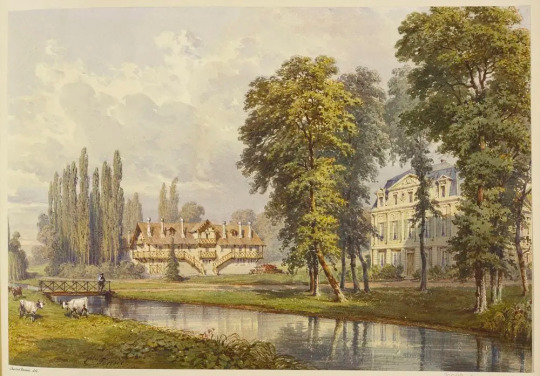
Both Soult and his wife were very attached to »l’Étang«, and the castle is an important topic in their correspondence. However, during the Restauration, after Soult’s return from exile, they had to sell the estate to the Duchesse d’Angouleme, in December 1821. Apparently they never attempted to get it back later. (I’ve found an interesting detail on this website: apparently, Soult demanded the castle be attached to another parish as he found the way to his church too long, meaning that, unlike some of his fellow generals, he actually did go to church. And Madame Soult had – sheep. Even a couple of merinos. Lannes’ enthusiasm seems to have been contagious. Somehow I now picture all the marshals walking their priced merinos on a leash, like Marie-Antoinette…)
According to Nicole Gotteri, the total price for the estate of Villeneuve-l’Étang was 270,000 Francs. The Soults made a down payment of 135000 francs in September 1802 and paid the remainder in two installments, on February 16 and August 26, 1803, at five percent interest. At which point Gotteri inserts quite an interesting list of income per annum for an officer in Soult’s position:
until 1798: général de brigade: ~12,000 Franc per annum
1799 – 1800: général de division: ~18,000 Franc per annum
1801: lieutenant général in Taranto: ~24,000 Franc per annum
Assuming Soult saved just about everything he had in income since his marriage (1796), that’s still only 96,000 Francs. So where did you acquire the rest of those 135,000 Francs in September 1802, Monsieur, hm? (Just because I have a soft spot for you doesn’t mean I’m not watching you! - Nicole Gotteri vaguely invokes »gratifications«, a term that may very well refer to the same thing that was seen as »French extortions« by those locals of occupied countries who through their war contributions had to finance the extra payments to French soldiers.)
-
Soult now being one of the four commanders of the »Garde Consulaire«, he also needed a representative »hôtel« in Paris and thus acquired a house in Rue de l’Université, No. 291, later No. 57, though it seems the entrance to the appartements where the family really lived (the rest of the house was rented to tenants) in the beginning was Rue de Lille, No. 498.
Soult bought the Paris house on the same day he paid off his first installment for Villeneuve-l’Étang, 16 February 1803, for 120,000 Francs – not a bad invest, considering that in 1865, the town of Paris had to rebuy it from Soult’s heirs for 1.47 millions, just so it could be torn down to make room for the reconstruction plans of famous baron Haussmann. Yes, this house is gone, too. I could not find any picture but would be very interested if somebody else manages to.
Update: I may have found something, even if it’s called No. 67 here:

-
Even Gotteri admits that the Soults acquired these very imposing houses before Napoleon truely installed his imperial court and ordered his militay chiefs to become gentlemen and even nobility. They clearly did not mind this development.
It’s quite likely that Soult over the years acquired more estates, particularly in his home region and for his family, but his main residencies (even if he barely ever saw them) were Rue de l’Université and Villeneuve-l’Étang. So let’s fast-forward to the time after Waterloo, when Soult was exiled and nolens volens had to find a place to live. This place was Alleestraße 7 in Düsseldorf, close to the Ratingen gate (»Ratinger Tor«) where, according to a newspaper, he rented a seven-room appartment for his family, lived a very retired life and did not even have his own carriage. (He did at one point join a local club, however.)
I do know there exists a drawing of the house as it looked back then, but I could not locate it online, sorry. In case anybody wants to check the quarter on Google Maps, please don’t get confused, the street has been renamed to »Heinrich-Heine-Allee«.
-
Which brings us back, full circle, to Saint-Amans. As stated above, finally allowed back to France in 1819, Soult sold his estate of Villeneuve-l’Étang to the Duchess of Angouleme in 1821, for a whopping 740,000 Francs! This decision still cannot have come easy to the family, but with Soult being effectively in disgrace and his income vastly diminished, upkeep for this ostentatious estate would soon become impossible.
Assuming that his days of fame were over (Soult had turned fifty when he came back from exile), he stayed in Saint-Amans longer and longer. From 1827 on, he built his house »Soultberg« on a hill about fifteen minutes from the village church of Saint-Amans.

This is the place where Soult lived most of the time during his remaining years (he probably had not expected there would be so many of them), even when he became minister of war during the July Monarchy. According to Anarchasis Combes he did not want people to refer to it as a castle, because…
A castle, he said, is a fortified building, and I had no ambition to imitate Vauban, by building a pavilion in the middle of a park.
So, this is what a pavilion à la Soult looks like. It is also the place where he died.
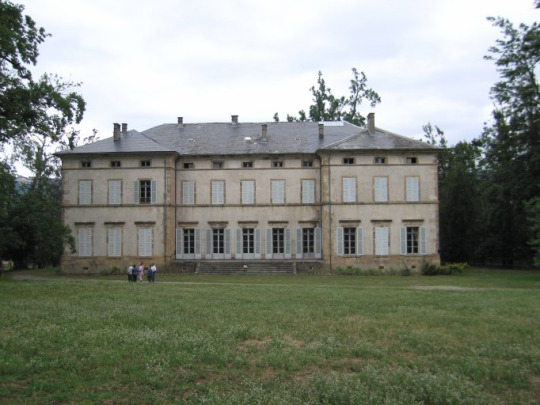
-
And then we have the very last building. Yes, Soult had his own funeral place planned and built during his lifetime.

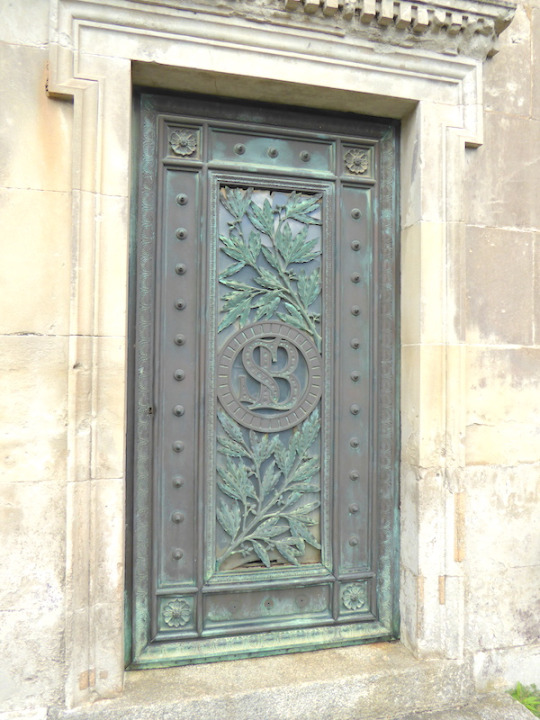
I think I have already posted that apparently, from this chapel on the side of Saint-Amans’ village church, one can see both the house that Soult was born in and the one that he died in. As if he wanted to overlook his whole life from his last resting place.
On a lighter note: That possessive »S« on the door of the chapel, hooked into the »B« of (Louise) Berg makes me smile every time I see it. Obviously, just because he was dead did not mean he would let go of her!
32 notes
·
View notes
Text

Note: Turkish,English,German and Arabic description
🇹🇷🦋Yanak inceltme yada popüler adıyla ‘Hollywood yanağı’da denilen ameliyat kısa süreli,kalıcı, etkin ve sonuçları çok başarılıdır.
🦋Buccal Fat Pad (BFP)Removal ,Partial buccal lipectomy, Hollywood yanağı, yanak yağı aldırma,yanak inceltme gibi isimlendirilir.
🦋Temel amaç yuvarlak, kare yada geniş yanaklı, elmacık kemiği(zigoma/malar bölge) çıkıntılı olmayan yüzü ince görünmeyen kişilere yapılabilir.
🦋En sık kadınlara yapılsada son yıllarda erkekler de tercih etmektedir.
🦋Yanakta bulunan bu yap yastığını ilk olarak 1732’de Heister tanımlamıştır.
🦋1802’de M.F.X.Bichat anatomik yapısını ayrıntılı açıklamıştır.
🦋Dr.Bichat adıyla anılan ‘Bichat yağ yastığı’ 4 uzantıya ve 3 ayrı loba ayrılır.
🦋Posterior(arka) lob; temporal, ptergoid, ptergopalatin be bukkal kısımlardan oluşur.
🦋Ameliyat tekniği: lokal anestezi genelde yeterli olup iki taraflı üst çene(maksilla) lateral(dış) mukozasından 5-10 mm’lik insizyon yapılarak ‘fatpad’in %40-50’i çıkartılır.
🦋Ortalama volüm 6mm kayıptır( kadınlarda 7.2-10.8 mm ve erkeklerde 7.8-11.3 mm).
🦋Bu miktardan fazla çıkartmalarda yanakta çökme ve/ veya asimetri oluşabilir.
🦋Bu ameliyatı bazı otorler 25 yaş sonrası için önerirler.
🦋Ameliyat süresi 20-40 dakikadır.
🦋Ameliyattan hemen sonra belirgin görüntü oluşsa da 2-3 hafta ödem/şişlik görülmesi doğaldır.
🦋7-10 gün korse kullanımı, antibiyotik, ağrı kesici, gargara ve ağız hijyeni önerilir.
🦋Genelde dikiş alınmasına gerek yoktur 1 haftada eriyecektir.
🦋İdeal görünüm 2-4 ayda ortaya çıkar.
🦋Deneyimli cerrahlarda komplikasyon minimaldir.
🦋Bazı araştırmalarda komplikasyon %8.45 bildirilmiştir.
🦋Bu komplikasyonlar; ödem, kanama(internal maksiller arter), enfeksiyon, asimetri, trismus, fasial sinir bukkal dal yaralanması, paratis bezi stenson kanal yaralanması sayılabilir.
Kaynak;
https://www.ncbi.nlm.nih.gov/pmc/articles/PMC6051676/
https://www.ncbi.nlm.nih.gov/books/NBK576413/
Note: Turkish,English,German and Arabic description
🇻🇬🦋Cheek thinning, or popularly known as 'Hollywood cheek' surgery, is short-term, permanent, effective and its results are very successful.
🦋Buccal Fat Pad (BFP) Removal, Partial buccal lipectomy, Hollywood cheek, cheek fat removal, cheek thinning.
🦋The main purpose is that it can be performed on people with round, square or wide cheeks, without protruding cheekbones (zygoma/malar area), and whose face does not look thin.
🦋Although it is most commonly performed on women, men have also preferred it in recent years.
🦋Heister first described this cheek pad in 1732.
🦋In 1802, M.F.X.Bichat explained its anatomical structure in detail.
🦋The 'Bichat fat pad', also known as Dr. Bichat, is divided into 4 extensions and 3 separate lobes.
🦋Posterior lobe; It consists of temporal, pterygoid, pterygopalatine and buccal parts.
🦋Surgery technique: local anesthesia is generally sufficient and 40-50% of the 'fatpad' is removed by making a 5-10 mm incision in the lateral (external) mucosa of the bilateral upper jaw (maxilla).
🦋The average volume loss is 6 mm (7.2-10.8 mm in women and 7.8-11.3 mm in men).
🦋Decals exceeding this amount may cause sagging and/or asymmetry on the cheek.
🦋Some authorities recommend this surgery for people after the age of 25.
🦋Surgery time is 20-40 minutes.
🦋Although a clear appearance occurs immediately after the surgery, it is natural to see edema/swelling for 2-3 weeks.
🦋 7-10 days of corset use, antibiotics, painkillers, mouthwash and oral hygiene are recommended.
🦋 Generally, there is no need to remove stitches, it will dissolve in 1 week.
🦋The ideal appearance appears in 2-4 months.
🦋Complications are minimal in experienced surgeons.
🦋In some studies, complications were reported as 8.45%.
🦋These complications; edema, bleeding (internal maxillary artery), infection, asymmetry, trismus, facial nerve buccal branch injury, paratis gland Stenson canal injury.
Source;
https://www.ncbi.nlm.nih.gov/pmc/articles/PMC6051676/
https://www.ncbi.nlm.nih.gov/books/NBK576413/
Hinweis: Türkische, englische, deutsche und arabische Beschreibung
🇩🇪🦋Eine Wangenverdünnung, im Volksmund auch „Hollywood-Wangenoperation“ genannt, ist kurzfristig, dauerhaft, effektiv und die Ergebnisse sind sehr erfolgreich.
🦋Entfernung des bukkalen Fettpolsters (BFP), partielle bukkale Lipektomie, Hollywood-Wange, Wangenfettentfernung, Wangenverdünnung.
🦋Der Hauptzweck besteht darin, dass es bei Menschen mit runden, eckigen oder breiten Wangen durchgeführt werden kann, ohne hervorstehende Wangenknochen (Jochbein-/Malarbereich) und deren Gesicht nicht dünn aussieht.
🦋Obwohl es am häufigsten bei Frauen durchgeführt wird, bevorzugen es in den letzten Jahren auch Männer.
🦋Heister beschrieb dieses Wangenpolster erstmals im Jahr 1732.
🦋Im Jahr 1802 erklärte M.F.X.Bichat seine anatomische Struktur im Detail.
🦋Das „Bichat-Fettpolster“, auch Dr. Bichat genannt, ist in 4 Fortsätze und 3 separate Lappen unterteilt.
🦋Hinterlappen; Es besteht aus temporalen, pterygoidealen, pterygopalatinalen und bukkalen Teilen.
🦋Operationstechnik: Lokalanästhesie ist im Allgemeinen ausreichend und 40–50 % des „Fettpolsters“ werden durch einen 5–10 mm langen Schnitt in der seitlichen (äußeren) Schleimhaut des beidseitigen Oberkiefers (Oberkiefer) entfernt.
🦋Der durchschnittliche Volumenverlust beträgt 6 mm (7,2–10,8 mm bei Frauen und 7,8–11,3 mm bei Männern).
🦋Abziehbilder, die diese Menge überschreiten, können zu Durchhängen und/oder Asymmetrien auf der Wange führen.
🦋Einige Behörden empfehlen diese Operation für Personen nach dem 25. Lebensjahr.
🦋Die Operationszeit beträgt 20-40 Minuten.
🦋Obwohl unmittelbar nach der Operation ein klares Erscheinungsbild auftritt, ist es natürlich, dass für 2-3 Wochen Ödeme/Schwellungen auftreten.
🦋 7-10 Tage Korsetttragen, Antibiotika, Schmerzmittel, Mundwasser und Mundhygiene werden empfohlen.
🦋 Im Allgemeinen ist es nicht nötig, die Fäden zu entfernen, sie lösen sich innerhalb einer Woche auf.
🦋Das ideale Aussehen stellt sich in 2-4 Monaten ein.
🦋Komplikationen sind bei erfahrenen Chirurgen minimal.
🦋In einigen Studien wurden Komplikationen mit 8,45 % angegeben.
🦋Diese Komplikationen; Ödeme, Blutungen (Arteria maxillaris interna), Infektionen, Asymmetrie, Trismus, Verletzung des Wangenasts des Gesichtsnervs, Verletzung des Stenson-Kanals der Paratisdrüse.
Quelle;
https://www.ncbi.nlm.nih.gov/pmc/articles/PMC6051676/
https://www.ncbi.nlm.nih.gov/books/NBK576413/
ملحوظة: الوصف باللغات التركية والإنجليزية والألمانية والعربية
🇮🇶🦋تنحيف الخد أو المعروفة شعبياً باسم "جراحة خد هوليوود" هي عملية قصيرة الأمد ودائمة وفعالة ونتائجها ناجحة جداً.
🦋إزالة وسادة دهون الخد (BFP)، استئصال شحم الشدق الجزئي، خد هوليود، إزالة دهون الخد، تنحيف الخد.
🦋الغرض الرئيسي هو أنه يمكن إجراؤها على الأشخاص ذوي الخدود المستديرة أو المربعة أو العريضة، دون عظام الخد البارزة (منطقة الوجنة / الوجنات)، والذين لا يبدو وجههم نحيفًا.
🦋على الرغم من أنه يتم إجراؤه بشكل شائع على النساء، إلا أن الرجال يفضلونه أيضًا في السنوات الأخيرة.
🦋وصف هيستر وسادة الخد هذه لأول مرة في عام 1732.
🦋في عام 1802، شرح M.F.X.Bichat بنيته التشريحية بالتفصيل.
🦋تنقسم "وسادة الدهون بيشات"، المعروفة أيضًا باسم دكتور بيشات، إلى 4 ملحقات و3 فصوص منفصلة.
🦋الفص الخلفي. وهو يتألف من الأجزاء الصدغية والجناحية والجناحية الحنكية والشدق.
🦋تقنية الجراحة: التخدير الموضعي كافٍ بشكل عام ويتم إزالة 40-50% من "السادة الدهنية" عن طريق إجراء شق 5-10 ملم في الغشاء المخاطي الجانبي (الخارجي) للفك العلوي الثنائي (الفك العلوي).
🦋متوسط فقدان الحجم هو 6 ملم (7.2-10.8 ملم عند النساء و7.8-11.3 ملم عند الرجال).
🦋الملصقات التي تتجاوز هذه الكمية قد تسبب ترهل و/أو عدم تناسق في الخد.
🦋توصي بعض السلطات بإجراء هذه الجراحة للأشخاص بعد سن 25 عامًا.
🦋مدة الجراحة 20-40 دقيقة.
🦋على الرغم من ظهور مظهر واضح بعد الجراحة مباشرة، إلا أنه من الطبيعي رؤية الوذمة/التورم لمدة 2-3 أسابيع.
🦋 يوصى باستخدام المشد لمدة 7-10 أيام، ويوصى بالمضادات الحيوية ومسكنات الألم وغسول الفم ونظافة الفم.
🦋 بشكل عام ليس هناك حاجة لإزالة الغرز فهي ستذوب خلال أسبوع واحد.
🦋يظهر المظهر المثالي خلال 2-4 أشهر.
🦋المضاعفات ضئيلة عند الجراحين ذوي الخبرة.
🦋في بعض الدراسات، بلغت نسبة المضاعفات 8.45%.
🦋هذه المضاعفات؛ وذمة، نزيف (الشريان الفكي الداخلي)، عدوى، عدم تناسق، ضزز، إصابة فرع الشدق في العصب الوجهي، إصابة قناة ستنسون في الغدة النظيرية.
مصدر؛
https://www.ncbi.nlm.nih.gov/pmc/articles/PMC6051676/
https://www.ncbi.nlm.nih.gov/books/NBK576413/
#opdrazimetozdemir#aesthetic#surgery#bestplasticsurgeon#turkey 🇹🇷#plastic#Bişektomi#bichectomy buccalfatpadremoval istanbul Istanbul Estetik plastikcerrahi#yanakinceltme#Bichat#estetikcerrahi#istanbulestetikcerrahi#buccal fat removal#yanakyagıalma#Hollowoodyanağı
2 notes
·
View notes
Text
Hamilton’s planned European trip, 1795
https://founders.archives.gov/documents/Hamilton/01-16-02-0294
[Philadelphia, April-May, 1794]2
My own hope of making a short excursion to Europe the ensuing spring increases. Believe me, I am heartily tired of my situation, and wait only the opportunity of quitting it with honor,3 and without decisive prejudice to the public affairs. This winter, I trust, will wind up my plans so as to secure my reputation. The present appearance is, that the depending elections will prove favorable to the good cause, and obviate anxiety for the future. In this event, my present determination is, to resign my political family, and set seriously about the care of my private family. Previous to this I will visit Europe. There I shall have the happiness of meeting you once more. But will not a few months afterwards give us the pang of a final separation? Let us hope the best. Adieu.
Both Founders and the versions printed in books note that this is “To a friend in Europe” (Henry Cabot Lodge) or “To Friends in Europe” (John Church Hamilton). It seems to have disappeared since - I wonder if this is one of the letters that Lodge destroyed by accident.
I cannot recall if this letter is discussed in other biographies. I’m guessing from the open and frank statements and chumminess, and the fact that there are clearly sections missing and it was in the possession of the Hamilton family, that the recipient was Gouverneur Morris (who likely “edited” this letter), who would remain in Europe until 1798, even after being replaced as Minister to France in 1794.
I don’t think I’ve come across any information about when/why AH decided he would not take a trip to Europe after his cabinet resignation - was it prior to his Whiskey Rebellion excursion? Or after their child was stillborn in November 1794?
Anyway, a nice record to go with the other known time he planned to travel to Europe (early 1802 with Philip). Grim if every time he made a plan to go to Europe a child died.
13 notes
·
View notes
Text
A Luthor Never Fails (at least not twice)
by mousetrap_47
Lena Luthor never held much value to her life, even if people saw her as a prissy, rich, white girl, successful because of nepotism. She was completely okay with death but never went out of her way to plan for it. So, what happens when Lena Luthor loses her grasp on the one healthy coping mechanism she has? She falls onto one of the (many) unhealthy coping mechanisms in her arsenal.
Or
Lena is tired, Kara is trying to help, but it may never be enough.
Warning: heed the tags for any triggers, and don't expect rainbows.
Words: 1802, Chapters: 1/3, Language: English
Fandoms: Supergirl (TV 2015)
Rating: Teen And Up Audiences
Warnings: Creator Chose Not To Use Archive Warnings
Categories: F/F
Characters: Kara Danvers, Lena Luthor, Alex Danvers
Relationships: Kara Danvers/Lena Luthor
Additional Tags: Lena Luthor Needs a Hug, Suicidal Thoughts, Suicide Attempt, Implied/Referenced Alcohol Abuse/Alcoholism, Angst, Kara Danvers Needs a Hug, Lena Luthor Knows Kara Danvers Is Supergirl
from AO3 works tagged 'Kara Danvers/Lena Luthor' https://ift.tt/DbYE5UF
via IFTTT
https://ift.tt/DbYE5UF
7 notes
·
View notes
Text
Who is the worst founding father?
Round 2: Button Gwinnett vs Robert Troup

Button Gwinnett (March 3, 1735 – May 19, 1777) was a British-born American Founding Father who, as a representative of Georgia to the Continental Congress, was one of the signers (first signature on the left) of the United States Declaration of Independence. Gwinnett was killed in a duel by rival Lachlan McIntosh following a dispute after a failed invasion of East Florida.
Gwinnett's business activities took him from Newfoundland to Jamaica. Never very successful, he moved to Savannah, Georgia in 1765, and opened a store. When that venture failed, he bought (on credit) St. Catherine's Island, as well as a large number of enslaved people, in order to attempt to become a planter. Though his planting activities were also unsuccessful, he did make a name for himself in local politics and was elected to the Provincial Assembly.
During his service in the Continental Congress, Gwinnett was a candidate for a brigadier general position to lead the 1st Regiment in the Continental Army but lost out to McIntosh. The loss of the position to his rival embittered Gwinnett greatly.
He became Speaker of the Georgia Assembly, a position he held until the death of the President (Governor) of Georgia Archibald Bulloch. Gwinnett was elevated to the vacated position by the Assembly's Executive Council. In this position, he sought to undermine the leadership of McIntosh. Tensions between Gwinnett and McIntosh reached a boiling point when the General Assembly voted to approve Gwinnett's attack on British Florida in April 1777.
Gwinnett had McIntosh's brother arrested and charged with treason. He also ordered McIntosh to lead an invasion of British-controlled East Florida, which failed. Gwinnett and McIntosh blamed each other for the defeat, and McIntosh publicly called Gwinnett "a scoundrel and lying rascal". Gwinnett then challenged McIntosh to a duel, which they fought on May 16, 1777. The two men exchanged pistol shots at twelve paces, and both were wounded. Gwinnett died of his wounds on May 19, 1777. McIntosh, although wounded, recovered and went on to live until 1806.
Robert Troup (1757 – January 14, 1832) was a soldier in the Continental Army during the American Revolutionary War and a United States district judge of the United States District Court for the District of New York. He participated in the Battles of Saratoga and was present at the surrender of British General John Burgoyne.
Troup was secretary of the Board of War starting in February 1778, and secretary of the Board of Treasury from May 29, 1779 to February 8, 1780.
Troup was a lifelong personal friend of Alexander Hamilton, with whom he had roomed at King's College and served in the Hearts of Oak militia unit, and he continued to support Hamilton in politics.
Troup was a co-founder in 1785 of the New York Manumission Society, which promoted the gradual abolition of slavery in New York, and protection of the rights of free black people. Despite being a slaveholder himself, Troup presided at the first meeting of the Society. Together with Hamilton, who joined the Society at its second meeting, Troup led an unsuccessful effort to adopt a rule requiring members of the Society to free any slaves that they themselves owned. In the absence of such a resolution, Troup himself waited to manumit his slaves, freeing four between 1802 and 1814.
#founding father bracket#worst founding father#founding fathers#amrev#brackets#polls#button gwinnett#robert troup
6 notes
·
View notes
Text
Un cousin DENAES, pensionnaire à l’hôtel des Invalides
Pierre Joseph DENAES est un petit-cousin de mon arrière-arrière-arrière-grand-père Jean François DENAES.

Il a vu le jour le 13 mai 1776 à Hazebrouck.

Son père Jacques DENAES était marchand. Beaucoup de ses frères et sœurs sont décédés en bas-âge. Du premier mariage de son père avec Rose ELIAS, en plus de Pierre Joseph, ont vécu jusqu’à l’âge adulte : Marie Angélique qui a épousé sur le tard, un veuf qui était tisserand à Zermezeele, Marie Françoise qui s’est mariée à un boucher de Cassel, Jacques WYON et Pierre Jean Baptiste qui était journalier à Hondeghem et qui a eu beaucoup d’enfants.
Pierre Joseph DENAES s’est probablement engagé dans l’armée vers l’âge de vingt ans. Il était fusilier dans la treizième demi-brigade. Il a vraisemblablement combattu en Italie puis en Egypte.
La vie de Pierre Joseph DENAES
A son retour de l’armée, Pierre Joseph DENAES qui avait perdu l’usage du bras droit a repris les activités de marchand de son père. Son père est mort le 29 mai 1802 et la deuxième épouse de son père, Marie Françoise PLOCKYN, le 4 novembre de la même année.
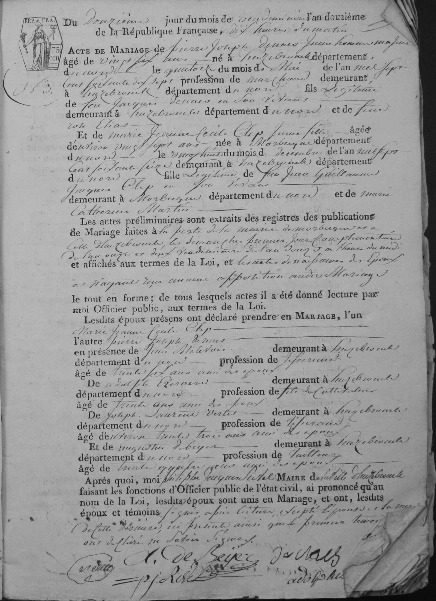
Pierre Joseph DENAES a épousé le 12 vendémiaire an XII (5 octobre 1803) une jeune-fille de son âge qu’il avait mis enceinte. Il connaissait bien Marie Jeanne Cécile CLEP car le père de celle-ci, Guillaume CLEP (1716-1800) avait épousé en premières noces Marie Joseph CLEP (1719-1765) dont la nièce était Marie Françoise PLOCKYN (1748-1802), la deuxième épouse de Jacques DENAES.

Caroline Sophie DENAES, la fille de Pierre Joseph et de Marie Cécile CLEP est née le 3 ventôse an XII (23 février 1804) à Hazebrouck. Il est à noter que son père était absent à sa naissance, sans doute pris par ses activités de marchand. Caroline n’a vécu que dix-neuf jours. Elle est décédée le 22 ventôse an XII (14 mars 1804) à Hazebrouck.
L’activité de marchand n’était sans doute pas assez florissante ou trop fatigante pour un homme handicapé ou encore l’épouse de Pierre Joseph DENAES aspirait-elle à ce que son mari ait une vie plus sédentaire comme l’un de leurs beaux-frères ? Toujours est-il qu’on retrouve Pierre Joseph DENAES, cabaretier à Morbecque, à la naissance de son fils Louis Alexandre Joseph, le 26 mars 1806.
Dans l’acte de mariage de ce fils, le 2 avril 1834, à Lille, celui-ci affirme qu’il réside à Lille, rue du Sec Arembault, depuis seize ans, soit depuis 1818. Des problèmes financiers ont sans doute conduit Pierre Joseph DENAES et sa famille à prendre le large à Lille.
Mais, dans une grande ville, la misère était encore plus rude, au XIX° siècle. Marie Cécile CLEP est décédée à l’âge de cinquante et un ans mais il est indiqué dans son acte de décès qu’elle en avait cinquante-cinq. Elle est morte le 29 août 1828, à l’hôpital Saint Sauveur de Lille. Ce sont deux infirmiers de l’hôpital qui ne savaient ni lire ni écrire qui ont déclaré son décès ! Le secrétaire de mairie a écrit le nom DENAES comme ça se prononçait, c’est-à-dire DENASSE et il a même déclaré que l’époux de Marie Cécile portait les prénoms d’Alexandre Joseph (ce sont ceux de son fils) au lieu de Pierre Joseph. Il y a fort à parier que son corps a été jeté dans la fosse commune.

Un an avant la mort de son épouse, le 1° juin 1827, Pierre Joseph DENAES qui ne devait pas être bien vaillant non plus, était admis à l’Hôtel des Invalides. Il avait alors cinquante et un ans. Le registre d’entrée, consulté au Service Historique de la Défense, à Vincennes, nous indique que Pierre Joseph DENAES a été pensionné à partir du 6 février 1830 mais le montant de la pension n’est pas indiqué. Il est également fait mention d’une réadmission à l’hôtel des Invalides, le 22 août 1832. On peut donc penser que Pierre Joseph DENAES est retourné vivre à Lille pendant quelques temps ou qu’il s’est trouvé un petit logement à louer à Paris.
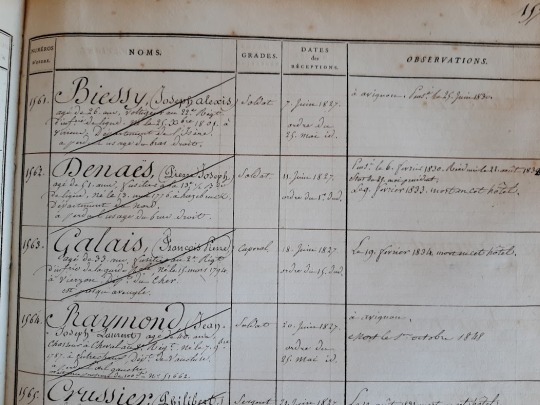
source: SHD/GR/2XY272
Pierre Joseph DENAES est décédé le 9 février 1833 à l’hôtel des Invalides. Il avait cinquante-sept ans. Il a été inhumé le 12 février suivant, au cimetière du Montparnasse, dans la fosse commune.

information donnée par Filae
A cette époque, de très nombreux soldats étaient admis à entrer à l’hôtel des Invalides. J’ai dénombré deux cent soixante-six entrées pour l’année 1827. La moyenne d’âge des entrants était d’un peu plus de cinquante ans, certains n’avaient qu’une vingtaine d’années et d’autres plus de soixante-dix ans.
La descendance de Pierre Joseph DENAES
Le fils de Pierre Joseph DENAES, Louis Alexandre Joseph qui était fileur de coton a donc épousé, en 1834, Florimonde Sophie Joseph BERNARD, couturière et de six ans sa cadette. Ce jeune-homme qui avait perdu ses deux parents allait donc se créer une nouvelle famille.
Ils ont eu un fils, Louis Romain DENAES, né le 23 mars 1836 à Lille mais la vie de ce pauvre enfant fut brève. Il est décédé à Lille, le 22 juin 1838.
J’ai remarqué que Louis Alexandre Joseph DENAES changeait souvent d’adresse. En 1828, il demeurait avec sa mère, 27 rue du Priez, en 1834, son adresse était rue du Sec Arembault, en 1836, il partageait avec sa femme un domicile au 23 rue Saint Nicaise et en 1838, ils étaient au 18 rue du Priez. Il est probable que lorsqu’ils ne pouvaient plus payer le loyer, ils étaient expulsés de leur modeste masure ou ils partaient à la cloche de bois et allaient s’installer un peu plus loin.
Je me demande si Louis Alexandre Joseph DENAES était encore à Lille, à la mort de son fils car ce sont deux voisins qui ont déclaré le décès. Louis Alexandre Joseph est mort le 30 juillet 1842 à l’asile d’aliénés d’Armentières, à seulement trente-quatre ans. Etait-il un trouble à l’ordre public, était-il trop souvent pris de boisson qu’il a dû être enfermé ?

Ainsi s’éteint la descendance de Pierre Joseph DENAES.
Du côté de Marie Cécile CLEP
Alexandrine Bonaventure CLEP, une sœur de Marie Cécile CLEP avait épousé, en 1797, le chef du bureau des impositions à Hazebrouck, Pierre MERVAILLIE dont elle a eu un fils, Louis MERVAILLIE qui fut marchand d’épices. Celui-ci n’avait pas encore un an et demi lorsque son père est mort. Sa mère épousa, ensuite, en 1802, un cabaretier de Morbecque, Dominique HUBERT.
Il se trouve que l’un des arrière-petits-fils de Louis MERVAILLIE était un ami de mon père. Pierre MERVAILLIE était né le même jour que lui, le 5 mai 1914, mais à Hazebrouck. Ils se sont peut-être connus au collège Saint Jacques à Hazebrouck ou plus tard, lors de leur service militaire, au 91ème régiment d’infanterie. Avec un autre ami, André VANNOBEL, né aussi le même jour mais à Wormhout comme mon père, ils formaient un trio. André VANNOBEL organisait des excursions d’une dizaine de jours, chaque année au mois de juin, dans les années 70 et 80. J’ai eu l’occasion de les rencontrer, à Paris, place des Ternes, en 1991, et je peux dire que l’ambiance était joyeuse.
PS: Je remercie vivement mon cousin Arnaud DENAES qui m'a permis de finaliser cet article en me fournissant l'acte du mariage à Lille du fils de Pierre Joseph DENAES.
Je remercie également les bénévoles de la base de données HOTEL DES INVALIDES (https://www.hoteldesinvalides.org/) et tout particulièrement Denise RAY qui m'a bien guidée dans mes recherches au SHD.
2 notes
·
View notes
Photo














------
May the ocean consume Myst
May Odeshava rule the land
------
after 3 player character deaths, i think the Drowned God Arc (our first completed arc of the campaign!!!) deserved its own post
special thanks to @thatonedud for being the prolific mastermind behind this campaign and best DM in the world (no i am not biased, this is a real scientific fact)
aviators, deep water dreams // richard siken, snow and dirty rain // the dear hunter, go get your gun // house phone, drinking song // felix de roissy, le poulpe colossal (1802) // murder by death, lost river // richard siken, detail of the fire // creedence clearwater revival, bad moon rising // mary oliver, when death comes // bonnie rogers, storm at sea (2011) // brandon sanderson, oathbringer // markiplier & the gregory brothers, space was cool // alfred, lord tennyson, the charge of the light brigade // aviators, we rise
8 notes
·
View notes